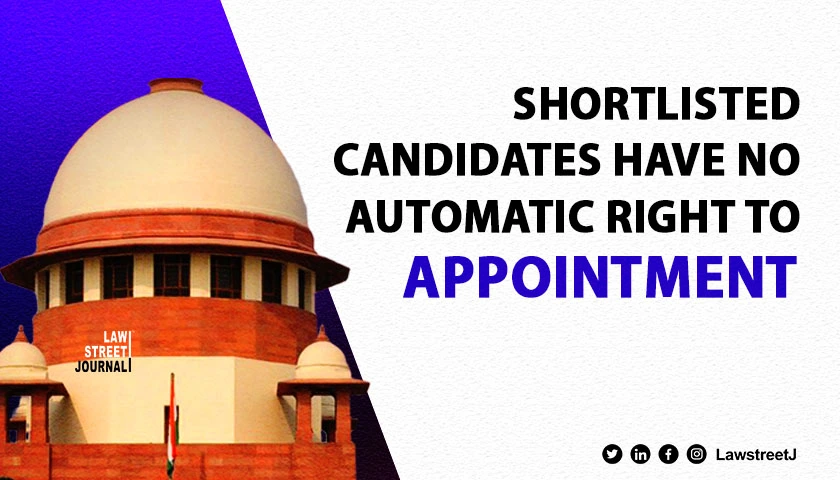New Delhi: The Supreme Court has recently held that even when vacancies are notified and an adequate number of candidates are shortlisted, these candidates do not acquire an indefeasible right to be appointed against those vacancies.
A bench comprising Justices Hrishikesh Roy and Prashant Kumar Mishra set aside the orders of the Calcutta High Court that had directed the West Bengal Board of Primary Education to appoint these candidates against the remaining 3,929 vacancies from the 2020 recruitment process. The apex court also held that the candidates did not have any legitimate claim for appointments as the panel/merit list had expired, and the entire selection process was marred by irregularities.
The Court was hearing appeals against the Calcutta High Court's judgment regarding the mode of appointment and the validity of the panel/merit list for the recruitment of primary school teachers in West Bengal.
The court, while allowing the appeal filed by the board, also referred to State of Orissa & Anr. v. Raj Kishore Nanda & Ors. It was held that a select list cannot be treated as a reservoir for appointments and vacancies can be filled up by taking the names from that list as and when required. It is the settled legal proposition that no relief can be granted to the candidate if he approaches the court after the expiry of the select list.
FACTS:
The facts of the case are that the West Bengal Board of Primary Education issued a notification for filling up 16,500 vacancies of primary school teachers. A Merit List was notified, and subsequently, two more Merit Lists were published, covering all the vacancies. The District Primary School Councils were then supposed to make appointments from these Merit Lists.
However, after the appointments were made, 3,929 vacancies remained unfilled, and some candidates approached the Calcutta High Court, seeking directions to fill up these remaining vacancies by reducing the cut-off marks. The Single Judge directed that the 252 Writ Petitioners be granted appointments against these unfilled vacancies.
Further, the Board challenged this order, and the Division Bench held that the entire TET-2014 selection process was fraught with irregularities and directed that the TET-2014 Eligibility List be treated as the Merit List to determine the inter-se positions of the TET-2014 candidates.
ARGUMENTS:
Mr. Jaideep Gupta and Ms. Meenakshi Arora, learned senior counsel appearing for the appellants, argued that the Division Bench's direction to make appointments based on candidates' inter-se positions in the TET Eligibility List 2014 was in contravention of the procedure specified under Rule 8 of the Recruitment Rules, 2016.
They further argued that the life of the panel/Merit List remains valid for only one year from the date of approval by the Board and that in the present case, since the panel was notified on 15.02.2021, it naturally expired after one year on 15.02.2022. However, the candidates filed their Writ Petitions in May 2022, approximately three months after the panel had expired. Therefore, no individual could have claimed any right of appointment about the particular recruitment process after the panel had expired.
Additionally, they also argued that the 3,929 vacancies that remained unfilled were carried forward through a Notification dated 29.09.2022 as part of a fresh recruitment cycle and under this new process, 9,500 appointments have already been made from the advertised 11,500 vacancies. Therefore, they submitted that it would be unfair to dislodge these appointed candidates from the current or previous recruitment cycle.
Per Contra, Dr. Menaka Guruswamy, learned senior counsel appearing for the candidates seeking appointment to the 3,929 leftover vacancies, contended that although the Merit List had been notified by the Board, marks scored by candidates were not provided. Additionally, she argued that even the candidates were not informed of their scores or the cut-off mark required to be included in the Merit List. In light of this, she argued that the entire selection process was shrouded in suspicion, thereby vitiating the appointment process.
It was further argued that the learned Single Judge in the Writ Petition gave sufficient opportunity to the Board to put forth the relevant information about the entire recruitment exercise transparently. Despite many such requests, directions, and reminders by the Court, the required information was not provided.
Since the Merit List was fraught with irregularities, the Division Bench rightly directed appointments based on the TET Eligibility List 2014 without a valid Merit List.
Dr. Guruswamy further contended that although the validity of the panel is one year as per Rule 12, there is a provision to extend it by six months at a time, up to a maximum extension of one year. Therefore, the candidates should be considered for appointment to the remaining 3,929 vacancies.
DECISION:
The court, after hearing both parties, held that the manner of shortlisting candidates for appointment as suggested by the Division Bench in the impugned judgments was inconsistent with the procedure laid down under Rule 8 of the Recruitment Rules, 2016, and hence, cannot be sustained.
It further held that no extension by any competent authority was granted to the 15.02.2021 Panel and therefore no relief can be granted to candidates who approached the court in May 2022 and also held that no further appointments are permissible from the recruitment process initiated on 23.12.2020 when a fresh recruitment process has commenced.
In conclusion, the court, while allowing the appeal, set aside the judgment rendered by the Division Bench and the earlier direction given by the learned Single Judge and further held that the 252 Writ Petitioners do not have any legitimate claim for appointments to the remaining vacancies.













